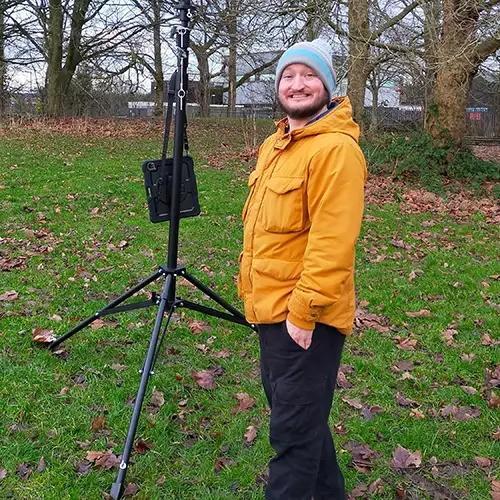

Tell Us a Little About Yourself
I have been a lecturer at the University of Cumbria for around a year and a half.
Immediately after my undergraduate degree, I focused heavily on graduate employment, which allowed me to reflect on global processes and business operations. I quickly became a mentor—a role that I loved and that sparked my passion for teaching.
After seven years in industry, I returned to academia to pursue a master's degree, rekindling my academic intrigue in coastal, digital, and surveying topics. Since then, I have won public speaking awards, poster competitions, and completed both my PhD and teaching qualifications, which I am delighted to use.
What’s Your Industry Background?
Initially, I worked as an offshore surveyor in dredge monitoring and environmental surveys. Through this experience, I became increasingly interested in the sensitivity of the habitats we operated in and how this might be represented by the data we were collecting.
Over time, I realized that many of my intuitions were accurate, which inspired me to pursue ways to influence and assist land managers, government officials, and stakeholders in discussing these issues.
Can You Tell Us About Your Research?
While still an early career researcher, I have enjoyed some exciting successes! I have been part of public engagement grants that encourage dialogue between farmers, town planners, and local government officials regarding sea-level rise.
Additionally, one of my academic contributions was presented at the United Nations Climate Change Conference (COP26), focusing on the potential underestimation of the value of saltmarshes as carbon-absorbing systems.
I am currently very keen to investigate the role of topography in driving species, climate, and habitat stability. I tend to think in digital methods such as laser scanners, drones, and advanced GPS, but I always keep in mind the decades of research that have come before us. Accessibility is a key aspect of research.
What Might Surprise People to Learn About You?
Students are often surprised to learn that I am a keen astrophotographer, motorcycle enthusiast, and that I travel to Manchester several times a year for gigs, most notably metal concerts.
What Modules Do You Teach?
I currently teach across all programmes at Ambleside, which I take pride in. This allows me to engage with all students at some point, each bringing their unique interests and skills to our discussions, which is always invigorating. I firmly believe that equitable communication is key to teaching and advancing knowledge.
What’s Your Favourite Thing About Teaching at Cumbria?
The best thing about teaching in Cumbria is the options. Upon arriving at Ambleside, you are in the heart of the Lake District and never more than an hour or so away from a vulnerable ecosystem or interesting landscape.
We have excellent connections with landowners and a range of charitable and corporate stakeholders within the Lake District National Park Partnership. This means our teaching, research, and students can impact how Cumbria operates.
Your interests and work here could even lead to this knowledge being transferred nationally or globally.
What Makes Your Course Different?
I was initially employed as a researcher at the University of Cumbria. During this time, I learned about the commitment to field-based, or experiential, learning. This vision is common at other universities but is rarely delivered effectively.
I chose to work at the University of Cumbria because I could see a real commitment to this vision. Paired with the access and location in the National Park, I felt there was no better place to develop my teaching style, based on my industry experience and focus on communication.
What Advice Would You Give to Students Considering This Course?
My key advice is to bring your hobbies and interests with you. The Lake District is a lovely place to live and study. The campus is small, but the site—the whole of Cumbria—is huge and diverse.
Try to explore using the bus network and find ways to incorporate your hobbies into this unique setting—whether it's drone footage, video editing, cycling, or even food culture. There are beautiful places to recharge and to observe Earth's processes in action. Take a weekend to have a BBQ, draw landscapes, or do some mapping.
The University provides all the equipment you need to do these things, free and available at all times to students, making for wonderful weekends.
Visit our Geography course page to find out more.
